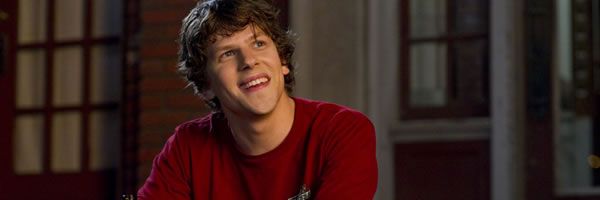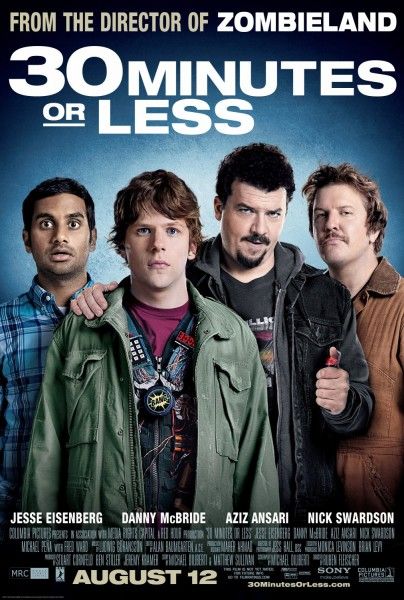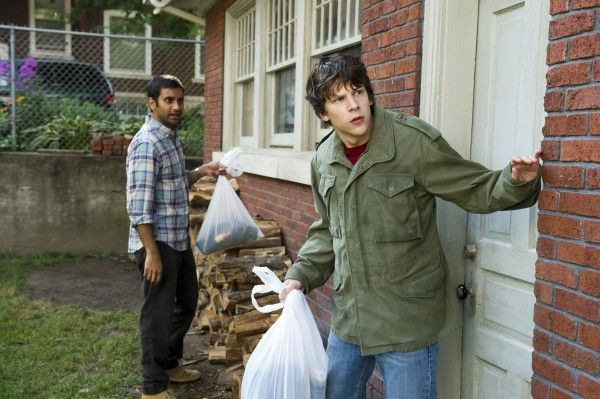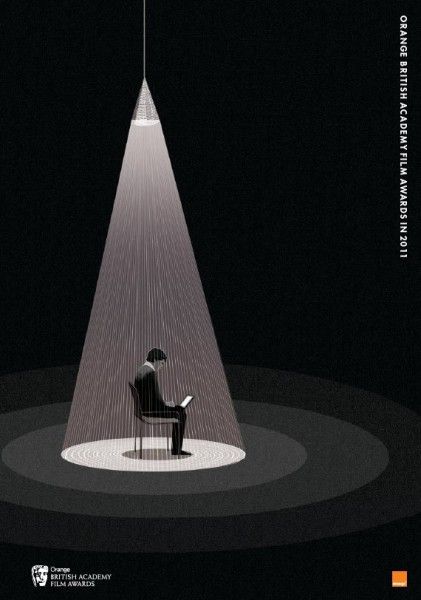Coming to theaters today is Ruben Fleisher’s 30 Minutes or Less. The film, which reunites Fleisher with his Zombieland star Jesse Eisenberg, tells the story of a pizza delivery boy (Eisenberg) who is strapped to a bomb and forced to rob a bank as part of a harebrained scheme hatched by two hapless criminals (Danny McBride and Nick Swardson) looking to inherent a fortune. Along the way, Eisenberg enlists his best friend, (Aziz Ansari) to help with the heist.
Recently, I got on the phone with Eisenberg to discuss the film. Unlike most actors, who seem to have been coached to death on what to say to every question, Eisenberg comes off as a genuine and intelligent person who actually considers the topic, rather than just reverting to scripted anecdotes. He even sources his jokes back to their originators. He’s an interesting guy who seems to be interested in acting far more than he is in being a “star”. During our interview, we discussed the pitfalls of action filmmaking, his approach to characters, how he would handle a bank robbery, why he doesn’t think Zombieland 2 will happen, Fred Durst as a director, Woody Allen, the pitfalls of being famous in the age of camera phones and much more. Hit the jump for the full interview.
This is the second time you’ve worked with Ruben Fleisher. He puts you in a lot more action-oriented roles than I usually see you in. Is it exciting to get to do a movie with more explosions than quiet moments?
JESSE EISENBERG: Not really. It takes a long time to shoot all of the scenes that are very fast paced in the movie. You know, Aziz Ansari, he plays the other guy in the movie, said, ‘It took us a week and a half to shoot a ten second car chase that’s not even that complicated. It must take The Fast and the Furious twenty-five years to film one of their movies!’ It takes so long to film these complicated car chase scenes and frankly, I don’t have a lot to add to it. You can scream a little bit, but then you feel dumb. And then you just wait for them to ask you to do something dramatic, which is the thing I’m more comfortable with.
My next question was going to be, ‘Is shooting an action film different than shooting a drama’, but I think you just answered that. Do you approach your character differently?
EISENBERG: My job doesn’t really change, actually. I don’t watch the movies I’ve been in. I try to stay as little aware of the final product as possible, because my job doesn’t really change. In this movie I’m playing a guy who’s a pizza delivery guy who’s living a normal, boring life until he gets a bomb strapped to his chest and forced to rob a bank. And, arguably, for him, that’s the most dramatic situation he will ever be in. But the movie is a comedy. Whereas, I did a movie last year where the characters are creating a website, which seems like not such a big deal, but it’s a drama. So a lot of times the character’s experience is not in accordance with the tone of the movie and it’s not really my job to account for the tone of the movie. That’s the director’s job. And I’m just so fortunate to work with someone like Ruben Fleisher who can allow me to act dramatically and take my job seriously, even if the movie is a comedy.
How do you think you’d do in a real bank robbery?
EISENBERG: One of the things I really liked about the movie is that a lot of the comedy comes out of the realistic way that these guys react to their insane situation. So they go into the robbery feeling like they’re the coolest guys in the world, like they’re the guys from Heat or Lethal Weapon, but they end up just apologizing to everybody and having to account for the awkward personal interactions they have with all the hostages. So if I ever do anything dangerous or bad to somebody, I would end up just apologizing the way these guys do.
Danny McBride told me he did a lot of improvisation on set, did you get in on it?
EISENBERG: Yes. I love improvisation. The truth is the script of this movie is really wonderful and had really funny comedic set pieces, which is really rare for a comedy, at least the ones I read. But when you’re on set and you’re with the other actors and you’re with the other props, you just naturally think of a million different things and Ruben [Fleisher] was just very encouraging of his actors to bring themselves to the role. So we would do a scripted take or a couple of takes of the script and then he would let us do things that maybe we thought of.
Is Zombieland 2 still in the cards?
EISENBERG: You know, I think it would be really difficult to make. Everybody in the movie is working on other stuff. And then the other thing is that the further away we get from it the more difficult it becomes to launch it because audience interest diminishes.
Did you ever discuss where it might have gone?
EISENBERG: I know they’ve written a few scripts. I haven’t read any of them; they haven’t sent them to me. But the truth is, Zombieland doesn’t really end. It’s a movie set in a fictitious world overrun by zombies, so you could pretty much do anything with it. Maybe another cross-country trip or something like that? There are some funny ideas, but they never gave them to me.
This film echoes certain parts of a recent real world story. How aware were you of the case when you read this script? Were there every any discussions about how to make sure that the film was clearly separate and tonally different from the events?
EISENBERG: If there were, I wasn’t part of it. When I got the script, I just thought, it’s an amazing vehicle, the bomb, to have these two guys do something they would otherwise never do. I loved the idea of having these two lazy guys go do something insane like rob a bank, and the thing that allows them to do it is this bomb. And it also served as kind of a great character motivator. I play a guy who, at the beginning of the movie is lazy; his life hasn’t worked out the way he wanted it to. He’s never completed a goal, he’s never even quit a job. He just waits around to get fired. In the movie he has ten hours with a bomb strapped to his chest and he uses it to do all of the things he should have done years ago: quitting his job, confessing his love to a girl, reconciling with his best friend. And that’s an amazing arc for an actor to get to play in such a short period of time.
You’ve worked with some real name brand directors. Fincher, obviously, you’re doing the new Woody Allen, but I want to know is how Fred Durst like as a director?
EISENBERG: No different. In fact, the reason I was cast in the Facebook movie was because [Fincher] served as a mentor to Fred Durst and was in the editing room to see what we had done on that movie. And Fred Durst is part of that band…which makes kind of, that very loud music. I haven’t heard it, but of course I’m aware of it. And he’s very different in person. He’s like anyone else who’s successful; they work very hard at what they do. It’s no coincidence that he’s successful. He’s a thoughtful, quiet guy. I think he’ll have a good directing career. The movie we did, it didn’t get much attention, but I think that he did a really good job with it. And as people continue to see it, you know, like everything it takes a bit of time, he’ll be able to do something good again.
But about that Woody Allen film, Bop Decameron, is the prospect of acting against Woody Allen stressful? Because it seems like his style is very influential on yours.
EISENBERG: It’s not stressful, it’s the opposite, It’s comfortable. When I discovered his movies when I was sixteen I felt like, ‘Here’s a guy who’s making movies and depicting life in exactly the way I see it’. And so to be involved with something is very comfortable. What’s more difficult is to make the big leap to perform in somebody’s work that you don’t agree with, something that’s totally distant to how you see the world and how you deal with people.
The Social Network really opened a lot of doors for you, can you still go get a cup of coffee or are you mobbed everywhere you go with people asking for photos for their Facebook?
EISENBERG: The latter, unfortunately. It’s been kind of the annoying byproduct of a very fortunate set of circumstances. I find it very difficult to do normal things without getting approached. The truth is people are very nice. The other truth is, it’s very annoying to be constantly interrupted. I don’t love myself enough to want to share myself with everybody. People are nice…I could see a world where maybe I am known for something that no one likes and people are mean, and that would be worse. But at the same time, I’m trying to walk down the street and it’s difficult to get to the end of it. And everybody has their camera and I’ve been famous for six months and this is the same six months that anybody who didn’t have a camera in their phone now has one. And everybody feels like they need a photograph because we’re in a generation where, if you don’t document it, it didn’t occur. So you’ve got to stop and take a picture with everybody.
Do you have any other films in the offing with Ruben Fleisher?
EISENBERG: No. I mean, we both work from project from project and don’t plan too far ahead because, you know, things change. But I think he’s a great director. And in two movies he has allowed me to…Ruben has done me a big favor in that he’s put me in two funny, accessible movies and allowed me to act well in them. And I don’t mean that I’m good in them, I mean that he allowed me to act in them. I haven’t seen this current movie, but I know that he allowed me to act in a way that I like to act, which is authentically, which is emotionally honest. And he lets me do that in two movies that are popular, fun movies. And that’s rare for an actor because, you know, you want to be in popular things, but often times, being in a popular thing means that you have to compromise your own acting. And he allows me to do both.




